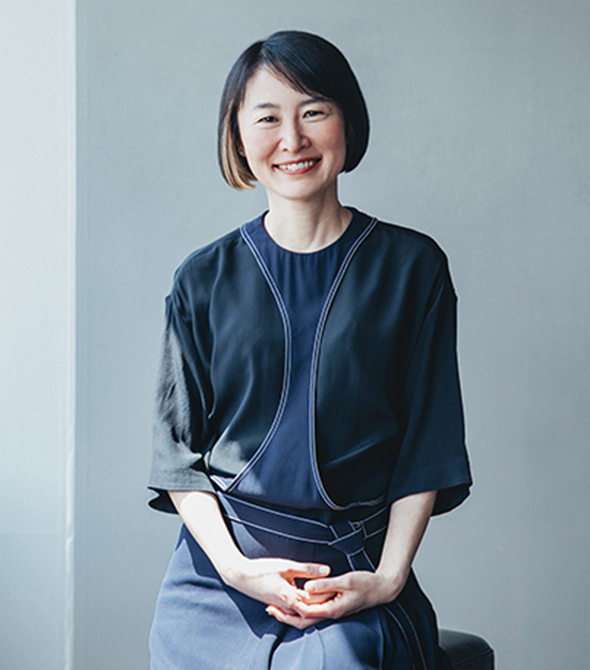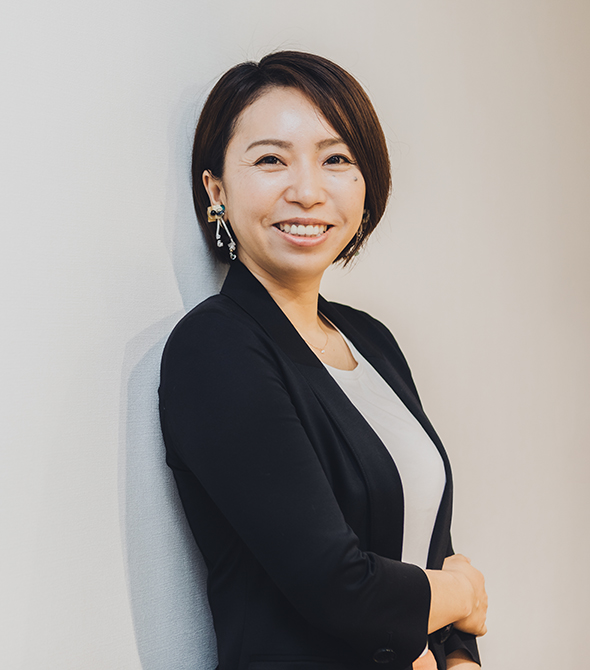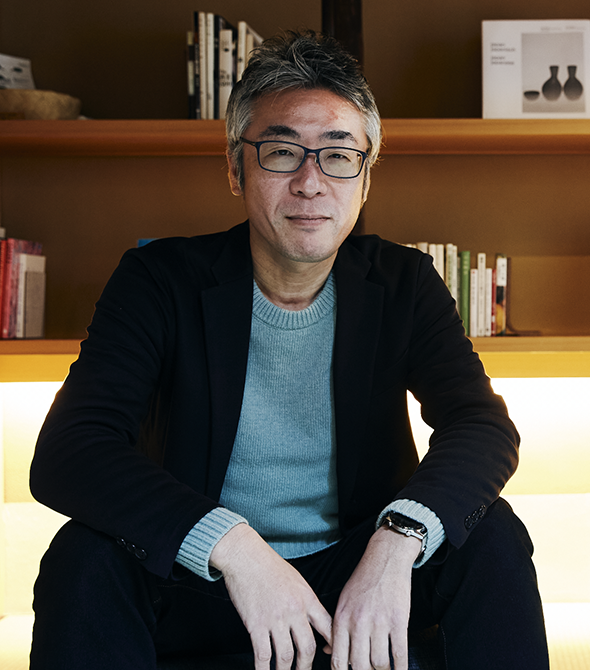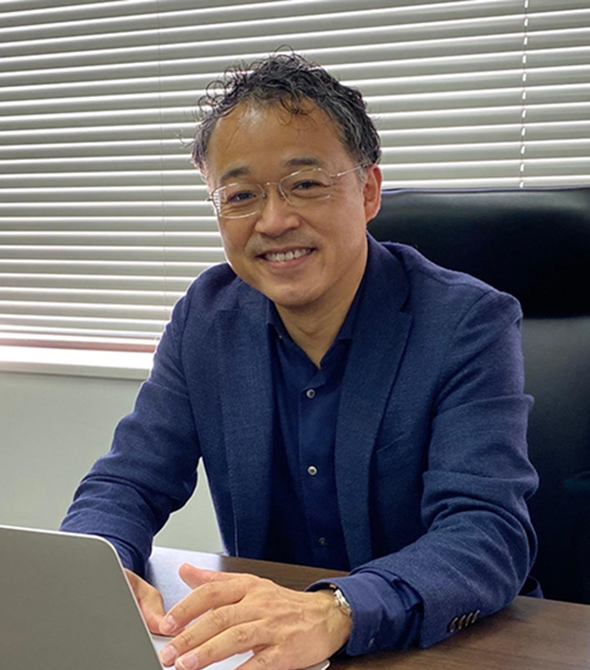Special Events
“Shigoto and Manabi: How I Walk Tomorrow-It’s Interesting Because We Live in an Age Where There Are No Right Answers-“
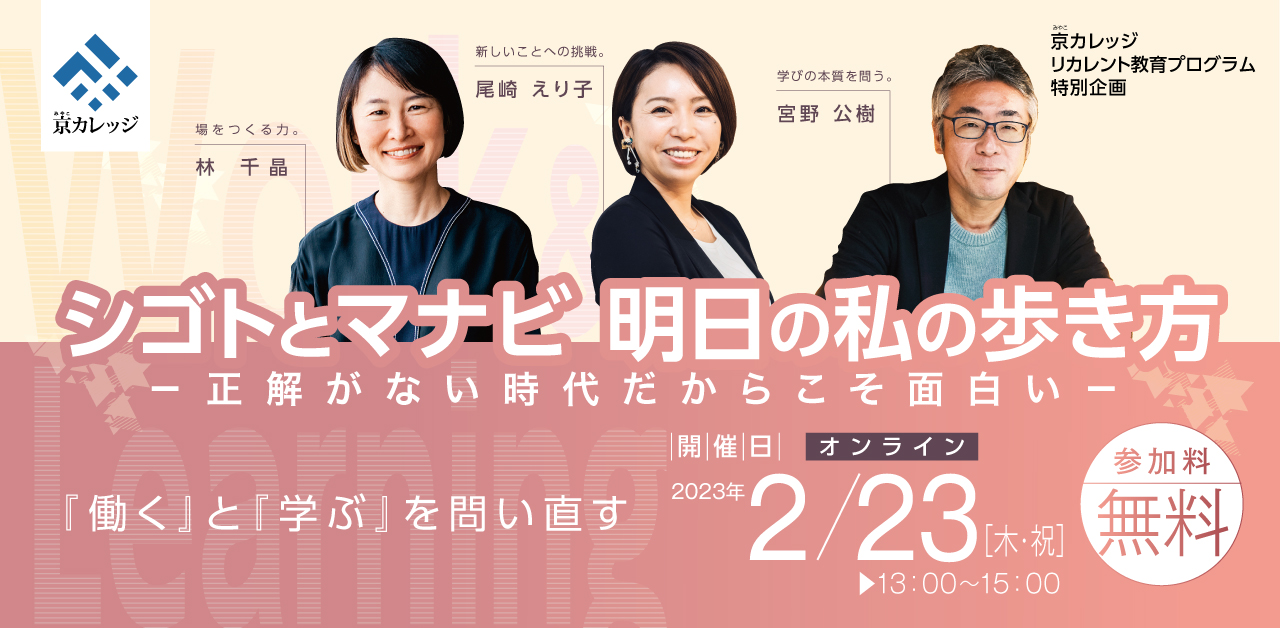
In 2022, the University Consortium Kyoto launched a “Recurrent Education Program” for working adults who want to learn while working. In implementing each program in FY2023, we have decided to hold a special project this time in order to make learning more familiar to the working generation.
In this project, we will have the opportunity to reconsider “working” and “learning” together with the participants in order to live in an era where it is difficult to predict the future and the environment is changing rapidly.
From the lectures and dialogues of each speaker, you will feel the fun of taking on new challenges and the importance of learning independently while working, and let’s create an opportunity to change your life from tomorrow together. We look forward to your participation.
| 日 程 | 2023年2月23日(木・祝)13:00~15:00 |
| 開催方法 | オンライン(Zoomウェビナー) |
| 参 加 料 | 無料 |
schedule
13:00~14:00
| 講演① | 場をつくる力!まだ出会っていない地域を巡って 林 千晶 氏(株式会社Q0 代表取締役社長) |
| 講演② | 新しいことへの挑戦!捨てる・恥じる・狂う 尾崎えり子 氏(株式会社新閃力 代表取締役社長) |
| 講演③ | 学びの本質を問う!学ぶとは何か。 宮野 公樹 氏(京都大学学際融合教育研究推進センター准教授) |
14:00~15:00
Dialogue Theme: Shigoto and Manabi: How I Walk Tomorrow
| 登壇者 林 千晶 氏(株式会社Q0 代表取締役社長) 尾崎えり子 氏(株式会社新閃力 代表取締役社長) 宮野 公樹 氏(京都大学学際融合教育研究推進センター准教授) |
| 対談ファシリテーター 石川 武 氏(喜一工具株式会社取締役社長、大学コンソーシアム京都 リカレント教育企画検討委員) |
You can download the flyer here [PDF]
How to apply
Applications for this program are now closed.
Meet the Instructors
| 氏名 | 林 千晶 氏 株式会社Q0代表取締役社長 |
| 略歴 | 花王を経て、2000年に株式会社ロフトワークを起業、2022年まで代表取締役・会長を務める。退任後、株式会社Q0を設立。秋田・富山などの地域を拠点において、時代を代表するような「継承される地域」のデザインの創造を目指す。グッドデザイン賞審査委員、経済産業省「産業競争力とデザインを考える研究会」などを歴任。森林再生とものづくりを通じて地域産業創出を目指す「株式会社飛騨の森でクマは踊る」取締役会長も務める。 |
| 氏名 | 尾崎 えり子 氏 株式会社新閃力 代表取締役社長 |
| 略歴 | 2年おきに何かに挑戦したくなる性格です。子どもを2人出産してから、2014年起業→2016年新規事業立ち上げ→2018年複数店舗経営&お笑い養成所に1年間通所→2020年、経営者しながら、奈良県生駒市教育指導課の公務員に→2022年、千葉県流山市から岡山県の村に移住。 |
| 氏名 | 宮野 公樹 氏 京都大学 学際融合教育研究推進センター 准教授 |
| 略歴 | 京都大学学際融合教育研究推進センター准教授。立命館大学理工学部卒業。同大学博士後期課程修了。その後、McMaster大学、立命館大学、九州大学を経て2011年より現職。京大総長学事補佐、文部科学省学術調査官の業務経験も。研究・イノベーション学会理事。一般社団法人STEAM Association代表理事。近著は2021年2月発刊「問いの立て方」(ちくま新書) |
| 氏名 | 石川 武 氏 喜一工具株式会社取締役社長 大学コンソーシアム京都 リカレント教育企画検討委員 |
| 略歴 | 1966年大阪出身。1990年同志社大学法学部卒業後、東洋信託銀行(現三菱UFJ信託銀行)勤務、三共精機株式会社代表取締役社を経て、2022年喜一工具株式会社に副社長として入社。2023年同社代表取締役社長。一方、2018年から大学コンソーシアム京都リカレント教育委員に就任。2018年京都大学ELPプログラム修了、2022年から同志社大学大学院総合政策科学研究科博士前期課程に在学中。 |
2022 Recurrent Education Program
“Contemporary Liberal Arts Course: The Present and Future of Space Migration”
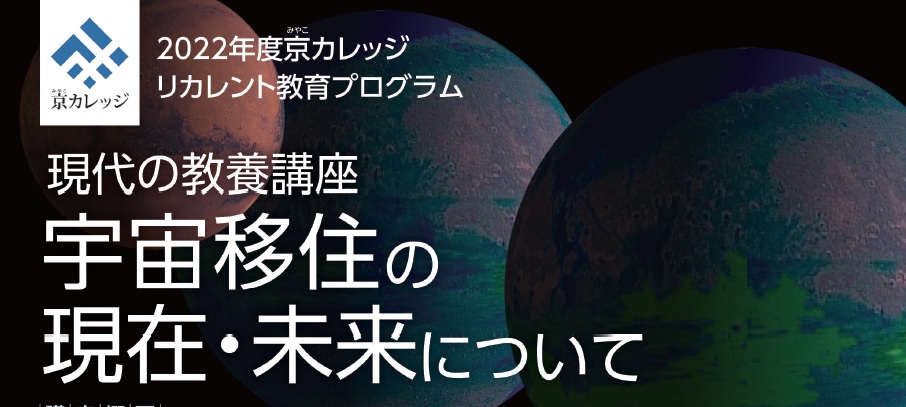
Course Outline
In order to meet the needs of working adults who want to learn more, the University Consortium Kyoto has decided to open a “Contemporary Liberal Arts Course”. This year’s seminar is titled “The Present and Future of Space Migration,” and students will learn about cutting-edge knowledge about manned spaceflight, which is currently attracting attention around the world, and migration to the Moon and Mars, from a wide range of perspectives, from the perspective of survival such as food and shelter to science and technology, medicine, and law. Learn about space and the importance of the global environment. I would also like all participants to think about what we can do to protect the global environment and the coming space age.
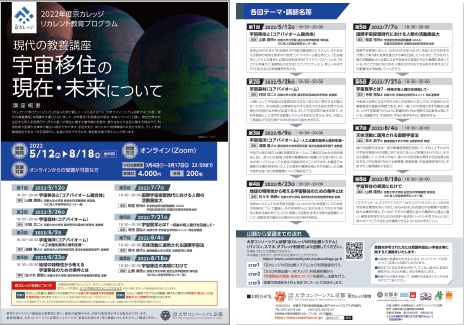
You can download the flyer here.
Course Period
Thursday, May 12, 2022 – Saturday, August 18, 2022
18:30 – 20:00 <8 sessions>
How to start the course
Online (Zoom Meeting)
Fees
4,000 yen (8 classes in total)
Eligibility
Only for those who can take the course online
Flyer
“Contemporary Liberal Arts Lecture ‘The Present and Future of Space Migration'” [PDF]
About the content of the course
The program will be conducted with the following contents.
|
Date & Time: Thursday, May 12, 18:30~20:00 Theme: Space Migration and the “Core Biome Complex” Lecturer: Yosuke Yamashiki, Professor, Graduate School of Sustainable Survivability, Kyoto University (Director, SIC Center for Human Cosmology) |
| The minimum system capable of “life support” on celestial bodies other than the Earth and the representative of the actual Earth ecosystem that supports them are called the “core biome complex,” and the technological system necessary for maintaining the “life support” system is named “core technology,” and the “recycling-type” society equipped with these is called the “core society,” and the concept of realizing a “space society” on a new celestial body is considered. |
|
Date & Time: Thursday, May 26, 18:30~20:00 Theme: Space Forest (Core Biome) Lecturer: Koji Murata (Associate Professor, Department of Forest Science, Graduate School of Agriculture, Kyoto University) |
| For humans, space has become a permanent destination, not an exploration goal. In order to achieve this, it is necessary to provide a sustainable supply of living spaces and living materials that provide mental comfort. We believe that a recycling system that grows trees in space and utilizes wood as a resource is effective. In addition, we will consider the possibility of using wood in outer space, such as wooden satellites. |
|
Date & Time: June 9 (Thu) 18:30~20:00 Theme: Space Ocean (Core Biome) – Artificial Aquatic Ecosystems and Food Production – Lecturer: Masato Endo (Associate Professor, Department of Marine Bioresources, Faculty of Marine Science and Technology, Tokyo University of Marine Science and Technology) |
| There is a method of raising individual aquatic organisms that make up small oceans (hydrospheres) in space, and exchanging substances such as food and waste between each organism, which can prevent the collapse of ecosystems. In this course, we will explain the technology for constructing artificial ecosystems using multiple aquatic organisms and the aquatic food production based on them, especially fish farming. |
|
Date & Time: Thursday, June 23, 18:30~20:00 Theme: Conditions for space migration from the perspective of the peculiarities of the Earth Lecturer: Takanori Sasaki (Assistant Professor, Department of Astrophysics, Graduate School of Science, Kyoto University) |
| How did Earth become a planet of life? We will discuss the peculiarities of the Earth as a living planet and consider its viability on other celestial bodies based on this knowledge. In addition, we will explore the conditions for solving various problems when actually considering space migration from the perspective of planetary science. |
|
Date & Time: July 7 (Thu) 18:30~20:00 Theme: Expanding the Sphere of Human Activity in the International Space Exploration Era Lecturer: Hiromitsu Inatomi (Senior Researcher, Institute of Space and Astronautical Science, Japan Aerospace Exploration Agency (JAXA)) |
| In international space exploration, Japan aims to produce first-class results in the field of science on the moon by the 2030s. In addition, there is a growing momentum for the realization of space habitation, which is necessary for the expansion of the sphere of human activity in the future. Therefore, it will be more important to consider the conditions under which a permanent human society can exist in space. |
|
Date & Time: July 21 (Thu) 18:30~20:00 Theme: What is Space Medicine? ―Aiming for future manned flights― Lecturer: Masahiro Terada (Associate Professor, Space Science Research Unit, Kyoto University) |
| In manned spaceflight, which is expected to become more active in the future, the health management of astronauts is an important issue. There are also more opportunities for the general public to fly in space, and there is a growing need to understand how people are affected by the space environment. In this lecture, we will focus on space medicine and astrobiology. |
|
Date & Time: Thursday, August 4, 18:30~20:00 Title: International Space Law as Applied to Celestial Activities Lecturer: Setsuko Aoki (Professor, Keio University Law School) |
| The current international space law, with the exception of some arms control provisions, shows little difference in the law of activities on celestial bodies and other parts of outer space. With this in mind, we will examine a legal system that regulates manned and unmanned space activities on celestial bodies. His research covers topics such as the jurisdiction and registration system for “space objects,” the law on the extraction of space resources, and human rights issues in space. |
|
Date & Time: Thursday, August 18, 18:30~20:00 Theme: Toward the Realization of Space Migration Lecturer: Yosuke Yamashiki (Professor, Center for Integrated Survivability, Kyoto University (Director, SIC Center for Manned Cosmology)) |
| I have learned about the concept of space migration that leads to the “core society” from the “core biome” and “core technology”. Various concepts are being developed by NASA and other space agencies and the private sector, but we will consider the technical and economic hurdles to realize these concepts and the differences between them and our own concepts, and when we will be able to build a space society. |
FY2022 Recurrent Education Program “Data Science Course for Workers”
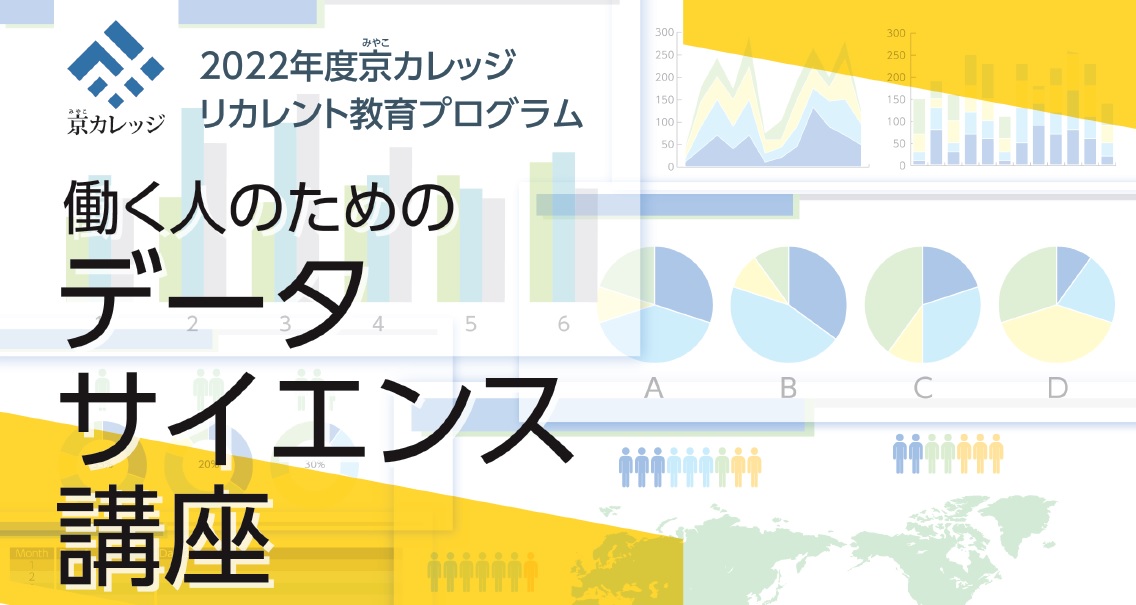
Outline of the lecture
ビッグデータを使ったデータ解析が様々な分野で注目を集めています。しかしながら、データがどのように分析され、活用されているのかについてそのプロセスを理解し、自ら実践する機会は働く環境の中で多くありません。
本講座では、ケーススタディを通して簡単な統計手法を身につけた後、データがどのように収集、及び分析されるのか実例を使って解説するとともに、実際のデータを使って、データ解析を行い、その作業を通して、データ解析への理解を深めることを到達目標とします。
Course Period
Saturday, June 18, 2022 – Saturday, July 16, 2022, 10:30 a.m. – 4:10 p.m. <3 days, 9 sessions>
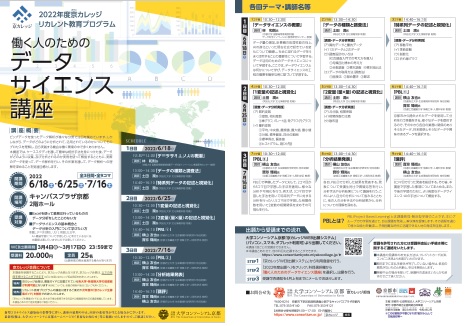
You can download the flyer here.
Locations
キャンパスプラザ京都 2階ホール
(京都市下京区西洞院通塩小路下る)
Fees
20,000 yen (3 days, 9 sessions)
Eligibility
- Those who use Excel for work but have never done data analysis
- Those who want to learn the basic concepts of data science and an introduction to data analysis
<注意>
既にデータ分析について学習した方や、AI・機械学習について学習したいと考えている方には、本講座は適していませんので注意してください。
Flyer
“Data Science Course for Working People” [PDF]
About the content of the course
The program will be conducted with the following contents.
|
Theme: “Introduction to Data Science” <1st session> 10:30~12:00 Lecturer: Kazunori Hayashi (Professor, Center for Data Science Innovation, Institute for International Higher Education, Kyoto University) |
| Students will get an overview of the changes that are currently occurring in society, such as the increase in the amount of data, the improvement of computer processing performance, and the evolution of AI, and learn about the importance of making good use of the data that abounds in society. Learn about data science for data utilization. Here, you will learn what data science is and get an overview of the data science process based on a simple example. |
|
Theme: “Types of Data and Survey Methods” <2nd session>13:00~14:30 Lecturer: Jun Tsuchida (Assistant Professor, Faculty of Culture and Information Studies, Doshisha University) |
|
<調査・データ分析実践>(a) Qualitative and quantitative data (b) Primary and secondary data (c) Iroha of survey design (introduction of the concept in Introduction to Social Research)(1) Concept of population and sample (random variables are not used) (2) Census (3) Sample survey (4) Sampling method (d) Method of obtaining data (survey method)(1) Interview method (2) Retention (3) By mail |
|
Theme: “Description and Visualization of Time Series Data” <3rd Session> 14:40~16:10 Lecturer: Jun Tsuchida (Assistant Professor, Faculty of Culture and Information Studies, Doshisha University) |
|
<調査・データ分析実践>(ア)移動平均 (イ)季節変動 (ウ)指数化 (エ)折れ線グラフ |
|
Theme: “One-variate description and visualization” <4th session>10:30~12:00 Lecturer: Jun Tsuchida (Assistant Professor, Faculty of Culture and Information Studies, Doshisha University) |
|
<調査・データ分析実践> (a) Qualitative variables(1) Frequency, relative frequency (2) Bar charts, Pareto charts, band charts (pie charts) (b) Quantitative variables(1) Mean, median, mode, maximum, minimum (2) Variance, standard deviation, interquartile range (3) Standard score, deviation value (4) Histogram, box plot |
|
Theme: “Description and Visualization of Bivariate (Quantities × Quantities)” <5th Session>13:00~14:30 Lecturer: Jun Tsuchida (Assistant Professor, Faculty of Culture and Information Studies, Doshisha University) |
|
<調査・データ分析実践> (ア)共分散,相関係数 (イ)相関係数の注意 (ウ)散布図 |
|
Theme: “PBL (1)” <6th session> 14:40~16:10 Lecturer: Tomoya Yokoyama (Specially Appointed Assistant Professor, Graduate School of Life and Environmental Sciences, Kyoto Prefectural University) Lecturer: Teruhisa Hojin (Professor, Department of Information Engineering and Human Sciences, Kyoto Institute of Technology) |
| Prepare to perform analysis using data provided by the City of Kyoto. Since various data is provided, each person selects data that is likely to be relevant to their work, data that is likely to be relevant in the future, and data that is of interest. |
|
Theme: “PBL (2)” <7th session> 10:30~12:00 Lecturer: Tomoya Yokoyama (Specially Appointed Assistant Professor, Graduate School of Life and Environmental Sciences, Kyoto Prefectural University) Lecturer: Teruhisa Hojin (Professor, Department of Information Engineering and Human Sciences, Kyoto Institute of Technology) |
| The data prepared in PBL(1) is subjected to various analyses and visualizations by applying the methods learned in the third to fifth frames. For example, analysis of time series data is performed using the method learned in the third frame, and the correlation coefficient learned in the fifth frame is used to determine the correlation of two variables and visualize it. |
|
Theme: “Presentation of Analysis Results” <8th Session>13:00~14:30 Lecturer: Tomoya Yokoyama (Specially Appointed Assistant Professor, Graduate School of Life and Environmental Sciences, Kyoto Prefectural University) Lecturer: Teruhisa Hojin (Professor, Department of Information Engineering and Human Sciences, Kyoto Institute of Technology) |
| Each student will present the results of their analysis in PBL (2). Students will have a question-and-answer session with each other about their presentations, and discuss analysis methods and analysis results. In this way, students will reflect on their own analysis and deepen their understanding of analysis from the analysis methods and results of others. |
|
Theme: “Commentary” <9th panel> Lecturer: Teruhisa Hojin (Professor, Department of Information Engineering and Human Sciences, Kyoto Institute of Technology) Lecturer: Tomoya Yokoyama (Specially Appointed Assistant Professor, Graduate School of Life and Environmental Sciences, Kyoto Prefectural University) |
| The following is a summary of the presentations made in the eighth session. After that, we will summarize what we learned in this course. In addition, more advanced data science and AI methods will be outlined for future learning. |














